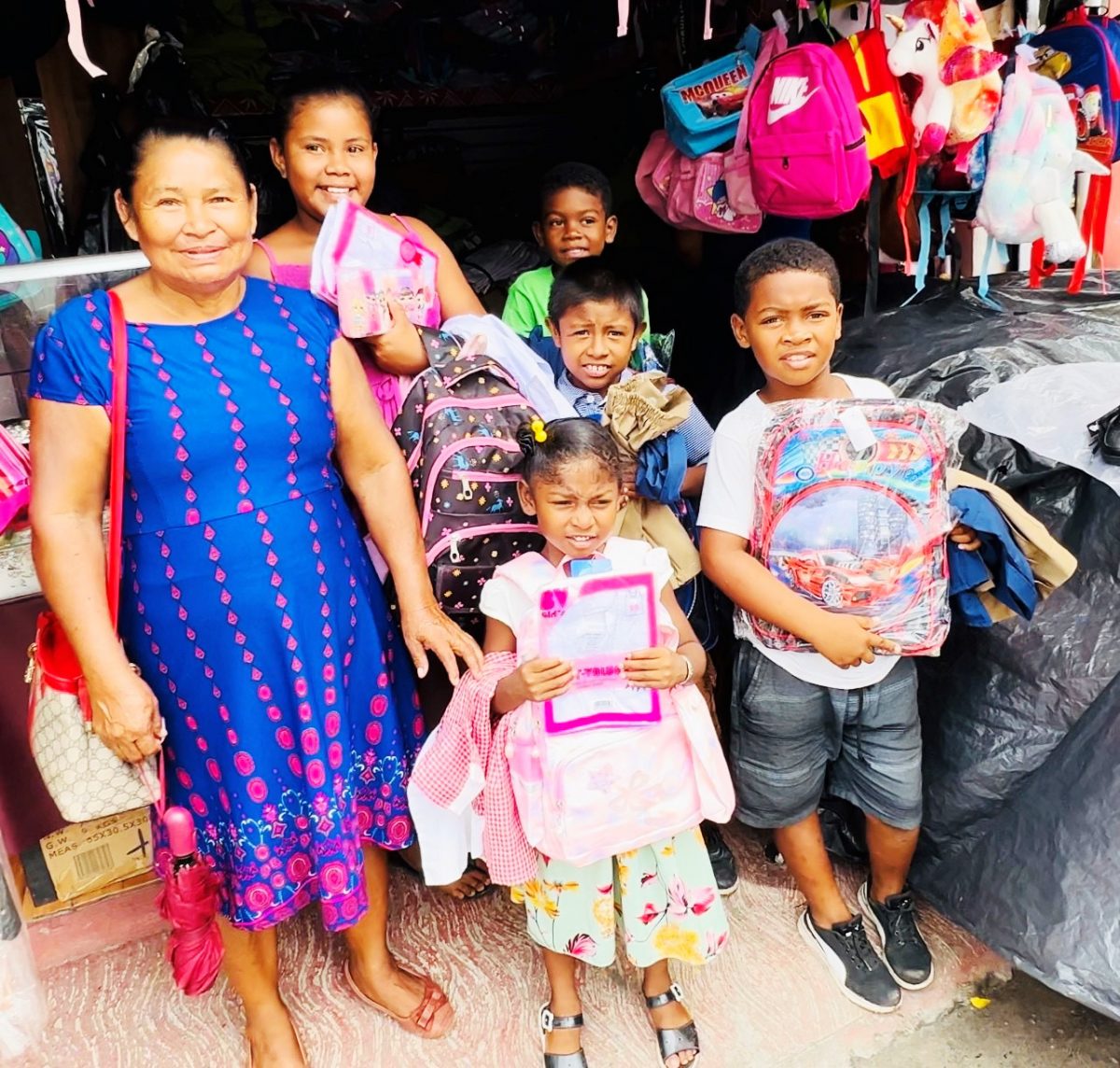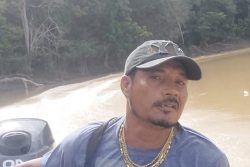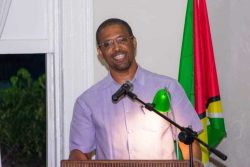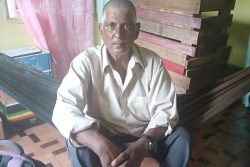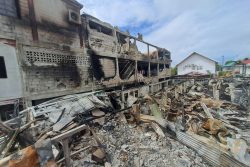By Shabna Rahman
Amanda Jones, 60, badly wants to move out of the Parika Sea Dam, East Bank Essequibo with her foster daughter, 11, and five grandchildren, as the area, which is prone to flooding and cannot be provided with water, electricity or good road, is not suitable to raise children.
Besides, the house is not convenient and the owner wants them to find their own place.
At the time too, she was concerned that school had reopened and she was struggling financially and could not afford to send them.

She barely had money for food and she was distressed that the children had outgrown their uniforms, footwear and other items she had purchased in July with their school vouchers.
Sitting on the stairs of the old rickety house, she told the Sunday Stabroek: “My main struggle is finance… Right now it’s really hard… it’s difficult. I’m a single parent and I’m sickly.” She is unable to work and she prayed a lot for God to help her.
This reporter who has a YouTube channel: ‘The Shabna Show,’ highlighted the woman’s plight and the video touched a lot of people who offered to help.
The first person who reached out was, Lucille Kendall, who sent money to assist the woman to get food and school supplies so they can return to school. Amanda felt relieved that Lucille helped to remove some of her stress and brought smile to their faces.
Another kindhearted person of Canada also sent a monetary contribution towards making the lives of Amanda and the children better. He was also moved by the woman’s sad story and decided to make a difference as well.
She used some of the money to purchase a mattress, replacing an old, worn out sponge that some of the children used to sleep on.
She told the Sunday Stabroek that she asked God to help her to overcome her struggles. “I want to thank God so much for what He has done for me because He touched y’all hearts to bless me…. I am really thankful for that because I know that it is not for me, it is for them.”
“And I know that my hand cannot reach my needs God make someone else hand reach it for my grands… I know God is blessing them and he is making a way for them.”
She said too that when this newspaper visited her before she was able to send the children out to school, she was very depressed and frustrated. After we got her the help and we returned to visit her she was very relieved and was laughing all the time.
Port Kaituma
When she moved from Port Kaituma five years ago, she rented a house in another section of Parika while she was working on a farm.
Three years ago the work became too difficult for her and she stopped because she suffers from hypertension and stomach ailments. Even if she’s willing to do any other work, no one would hire her because of her age and her health condition.
As such, she could not afford to pay the rent and three years ago she was forced to leave. The person she worked for on the farm, offered them to stay with him in his tiny house, which has no bedrooms, until they get somewhere better to move to.
Amanda’s sister gave her a spot on her piece of land but she needs help to build a house. Desperate to move out of the Parika Sea Dam, she used some old roofing sheets her sister lent her, to knock up a little zinc shack but it is leaking and not fit for them to live in.
Amanda said the sea dam is no place to raise children because some men from other areas would go there and consume alcohol with some of the residents and play music loudly until late at nights.
The men would also use indecent language and disturb them from sleeping. “That is not right for the children and I does go to church and I don’t feel comfortable with this…”Amanda said.
Foster daughter
She has been raising the children since they were very small and they all call her “mommy.” She took charge of her foster daughter when her biological mother, who was suffering abuse, left her when she was seven-months-old.
The mother told Amanda that she was going in “the bush” and would return for the baby. Two months later she showed up and gave Amanda $20,000 and promised to return for the baby. The girl is now 11-years-old and Amanda has never seen her again.
Originally from Port Kaituma in Region One, she moved to Parika five years ago after her husband died.
“I struggled for five years after my husband died. And in between that my daughter was working and she got involved with a guy who is treating her really bad… He is abusing her a lot. He beat her and he curse her… He is not finding a [proper] home for her to live in…”
The youngest grandchild was spending some time with Amanda’s sister, Jacklyn, who lives in a nearby village because she was not able to take care of him.
“He is still using the porridge stuff… and I didn’t have and he be crying. I don’t even have pampers for him, so my sister said, “I’m going to help you with him until you can find stuff for them.”
Regularized
“We don’t have any light and water in here and the road is so bad. She catches rainwater in some old plastic barrels in the yard and would “care it for drinking.” She would use water from the river for other chores like washing and cooking.
When we visited her again, she and the one of the youngest grandchildren had contracted vomiting and diarrhoea and she suspected that it was because of the condition of the water.
The road is also in a deplorable state because the area cannot be regularized as it is in a sea defence-sensitive area.
When she just moved to the area she planted a kitchen garden and “I used to get greens but the floods come and destroy the plants. Since then I never plant back because the water always come up.”
Ulin Samsudeen
Among the oldest residents who started squatting on the sea dam for the past 30 years, is Ulin Samsudeen, who gave birth to 13 children, (eight of whom are alive). One of her brothers had occupied a spot on the sea dam sometime before that.
She belonged to Craig on the East Bank of Demerara and decided to move there because “rent was expensive and you naa get renting house when you have nuff children.”
While it is tough living there because the area lacks infrastructure, she likes it because her children’s “work site” was right there. Many boats dock in the area for repairs etc. and some of the residents would get maintenance or guard work on them.
If she gets an opportunity to move she will move but she wants to be close to her children. About 16 years ago she was given the documents for a house lot on the West Bank of Demerara. At the time she only had $15,000 and she went in to pay for it but “dem na accept it in Georgetown…“
She went to Vreed-en-Hoop because she was told that she had to apply again. She filled up two forms but she never went back because “how they have me swinging me around me get down courage.”
Ulin’s husband suffered a stroke eight years ago and is bedridden. She does everything for him.
In an invited comment about the Parika Sea Dam via telephone, Minister of Housing and Water, Collin Croal had told Stabroek News that a team from his ministry will visit the area. The team will advise squatters on how they can find suitable housing.
The Minister’s statement followed a report in the Sunday Stabroek of December 25th on the circumstances of squatters on the sea dam.
Croal pointed out that the area where the squatters occupy is sea defence reserve and must be maintained. “It’s about doing the right thing, they can apply for house lots. There is a regional office in Region Three [where] they can visit the office. We cannot regularize the sea defence.”
During a meeting at Greenwich Park Primary School to hand over Certificate of Titles to residents who had been squatting on government land for several years, Croal reiterated that sea dams are a “no no for regularization. Sea beds, riverbanks are a no no… So we have to take into consideration the usage of that land, the access and why is it required…”
He said too that the sea defence is protecting the environment “from erosion and from any possible flooding.
So obviously we have to have access to ensure maintenance is done. You can’t build anything there because when you have overtopping from the salt water it can be very destructive.”
He advised the Parika Sea Dam squatters to “do the right thing and visit the regional office and make an application for a house lot and in due time it will be processed.”
This newspaper had highlighted the struggle of Nandranie Budhoo, 28, who grew up in impoverished conditions and was never able to escape it. Her three sons, ages two, seven and eight have also ended up in the cycle of poverty. Her mother is helping her to take care of her eldest son.
Her husband is a push cart operator at Parika Stelling but he does not get work every time he goes out. Sometimes they would have no money for food. The family does not have a bathroom and their toilet does not have a door.
For the past nine years they have lived in a ramshackle house and the rusted roofing sheets have holes and are leaking. They have placed a tarpaulin on the roof but rain would still get in. They would then hang saucepans “to catch the water.”
She told this newspaper that she badly wants to move out of the area because of the constant flooding and the inconvenience of living without basic necessities. Her children are also getting sick because of the floodwaters.
Since her story was published, many people reached out and wanted to help her. So far, Fred Chand, of Atlanta, Georgia has sent monetary assistance for groceries and to help make her life more comfortable.
Fred has also sent a monetary contribution to Virginia Samuels, a survivor of domestic abuse who is still living in poverty, to provide grocery and other items she and her children need. They are also planning to help other squatters to make their lives better.
